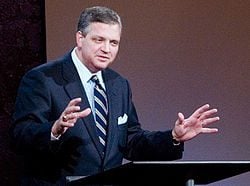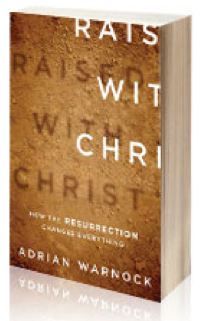
It is a real pleasure to welcome to my blog again today, Dr. Albert Mohler. Dr. Mohler should need no introduction to most of my readers, but I include a link to his biography for any who need to know more, as well as a link to my Together for the Gospel Conference Round Up Post.
This interview is being serialized over several days. So far I have published parts one, two, three, and four. Today we discuss the Together For the Gospel statement released at the conference.
Adrian
Up until now, Together for the Gospel has been founded, as far as I can tell, purely on the relationships of you four guys – what made you decide to issue a joint statement of faith and is that how you all see the document?
 Dr. Mohler
Dr. Mohler
I should clarify that we do not see our document as a statement of faith, presented in confessional form, but as a statement of common convictions and concern. We are not seeking to supplant the historic creeds and confessions of our faith, but we are speaking to a specific set of urgent concerns that are based in a specific set of deeply held convictions. We would see the document as a manifesto of concern, not as a replacement for our creeds and confessions.
Adrian
What was the practical process behind this document – there is a rumour circulating that you wrote it yourself with very limited input from the others – is that a fair description?
Dr. Mohler
Well, in the actual writing process, that is true. Nevertheless, the document grew out of our investment in hundreds of hours of conversation. Beyond this, all four of us contributed topics and concerns we wanted to be in the statement. I wrote the original draft, but the final product represents all four of us.
Adrian
How much did other similar documents influence your work on this document – which previous statements of faith did you draw upon?
Dr. Mohler
In terms of previous statements of faith, I drew upon a wide range of documents from the Reformation tradition—especially the tradition closest to our own. Beyond that, previous statements of crucial evangelical concern were also informative. We were particularly informed by movements and statements such as those associated with the International Council on Biblical Inerrancy, the Alliance of Confessing Evangelicals, and similar movements.
Adrian
Do you think it is important that every generation works though theological positions based, at least in part, on the theological contoversies of its age?
Dr. Mohler
This is certainly true. It was true in the early fourth century when Athanasius helped the church to forge an orthodox Christology at Nicaea. Every generation brings its own theological controversies, and it is especially important that we work through these controversies in a way that honors God’s truth and protects the deposit of faith entrusted to us.
Adrian
Some have speculated that you plan on using this document as some kind of yardstick of orthodoxy – is that true? Do you plan to anathematise those who cannot sign it for some reason? What kind of uses do you imagine it being put to?
Dr. Mohler
Actually, those are functions that belong to churches and denominations. The four of us claim no power to anathematize those who could not or would not sign the document. At the same time, we do hope that the statement helps to define what leads to health and to unhealth in Christ’s church. In terms of our cooperation and our willingness to recognize evangelical identity, this statement is indeed intended as something of a standard. We would not claim to be the universal arbiters of orthodoxy in Christ’s church. Our goal is simply to offer a word of witness and to make clear where our own sense of cooperation for the cause of the Gospel is defined. Our statement is a clear and heartfelt call to biblical fidelity.
Adrian
When considering the positions which you would include in the document, what criteria did you use for your theological triage? There are some issues that you address and have a position on that some people would see as peripheral, and others that you don’t address that others would also say were fairly essential.
Dr. Mohler
Those are fair questions. In the first place, we did not seek to repeat the good work accomplished by other movements and organizations. As I’ve already mentioned, we assumed the work of groups such as the International Council of Biblical Inerrancy. Thus, we did not seek to replicate the Chicago Statement released by that organization in defense of biblical inerrancy. Similarly, we were not seeking to write a new creed or confession of faith, so there is an entire range of doctrines that are not directly addressed in our statement. We directed ourselves to those issues and concerns that we felt had not been adequately addressed by previous movements. Even within our statement, we recognize that not all issues are of equal consequence. Nevertheless, we did sense that these issues shared a common urgency.
Adrian
I mean, to make it specific, I have seen some people asking why you see modes and the practice of baptism as not requiring a joint position to work together on. Why is that?
Dr. Mohler
The answer to that question is quite simple—we are deeply committed to our own confessions of faith and we are quite clear about those commitments. There is no ambiguity in the fact that Ligon Duncan is a Presbyterian pastor. I can hardly hide from the fact that I am, by deep conviction, a Baptist. Mark is also a Baptist, and C.J. is a representative of a newer tradition, deeply rooted in the faith once for all delivered to the saints. If we intended our statement to be adopted by any specific group of churches, we would be obligated to speak to those specific questions related to baptism. But, as this was not our purpose or focus, it would have been foreign and strange for us to have addressed that question in this document. I would point once again to the Chicago Statement on Biblical Inerrancy. It spoke directly to the issue that brought that group together—bi
blical inerrancy—and not to a host of other, equally important issues.
Adrian
Others on the net have already expressed surprise that you seem to view the role of women in ministry as essential enough to working together to include in the document. What guided that decision?
Dr. Mohler
The decision on complementarianism as a common tenet grew out of a mixture of our conviction and experience. We recognize that there are true Christians who disagree with us on these issues. Nevertheless, the issue of the role of women has now risen to a status and significance that makes common effort extremely difficult. For one thing, such common effort requires the implicit, if not explicit, recognition of women as pastors. We consider this issue to be so important, and the biblical issues so crucial, that we do not see this cooperation as advisable or healthy.
Adrian
And what of the lack of a mention of any statement concerning the charismatic issue – why was that left out?
Dr. Mohler
Interestingly, this was not even a major issue of discussion. None of us is a charismatic in any conventional sense. Our understanding of these issues is sufficiently clear and united that it has never become an issue of consequence among us. It is fair to say that the issue did not emerge as a topic suggested for inclusion in the statement. This is not because we are not concerned about these issues. I am particularly concerned about the excesses of the charismatic movement. Nevertheless, this was just not our concern in this project.
Adrian
As a Southern Baptist, you can’t get away from an interview like this without being asked about the recent decision of the SBC IMB to exclude tongues-speakers from all future missions appointments. What is your perspective on this? At first sight, it would seem to be contrary to the spirit of “together for the Gospel” or is this in some way different because it is taking place back in the world of denominational relationships where I assume you would want to hold more tightly to some of the distinctives?
Dr. Mohler
Your last statement is precisely where I am headed. I must also stipulate that the decision to exclude those who speak in tongues from mission appointments is not actually a new policy at all. The new policy relates to what some have called a “private prayer language,” but is not, in the main, associated with what most people consider speaking in tongues. I do not consider this practice to have any adequate biblical foundation. Nevertheless, I am able to work together with persons who might practice such things in the cause of the Gospel. Nevertheless, this would not be an institutional unity but a unity in the spirit of Christ.
In other words, I can celebrate the fact that some of my charismatic brothers will lead persons to Christ and preach the Gospel with authenticity. Nevertheless, it would be impossible for me to establish a church together or for us to be united in a denomination’s position on these questions. There is no question that the Southern Baptist Convention is not a charismatic denomination. It never has been and, so far as I can foresee, it is not open to being so in the future. Nevertheless, our missionaries gladly work alongside charismatic missionaries and our pastors gladly work in the same community with charismatic pastors. I think some persons confuse institutional and spiritual unity in these matters.
Adrian
In thinking about the issues on which you have chosen to make a stand together and those that you have not, I guess one of the conclusions I have come to is that you have chosen to address issues where either compromise in those areas in some way threatens the Gospel, or where it is possible for a group to work together for the Gospel without any of the individuals compromising their position.
Thus, for example, those who believe that certain acts of ministry should only be taken by women would struggle with working together with the women preachers who thought otherwise without compromising that position. On the other hand, since when you get together no one is baptising anyone else, it is possible for different positions to co-exist without anyone repudiating their positon. Is that a fair conclusion for me to have come to? Do you concur?
Dr. Mohler
I think that is a very fair summary of our approach. You have delineated very well the distinctions on these issues.
Continued in Part Six . . . .















